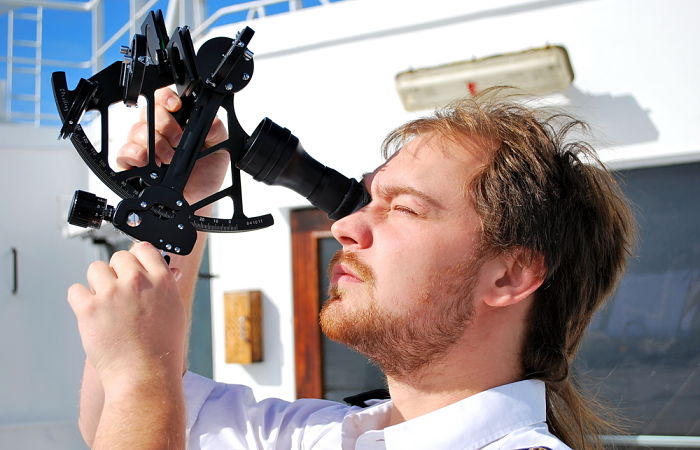 In the age of Google maps, GPS and AIS, there is something in the wheelhouse that looks so outdated.
In the age of Google maps, GPS and AIS, there is something in the wheelhouse that looks so outdated.
I am talking about sextant and getting the position of the ship by sextant.
Now before you yawn and find some more sexy navigation topic to jam on, hear me out.
Sextant has something unique that all the advanced technologies cannot match.
It can give you your accurate position without relying on any electronic aid or satellite.
That is the reason sextant has been there and as far as we can tell, it always will be.
But there is also a drawback. To get a position from the sextant requires some calculations and expertise in handling the sextant.
Also, the position is not instant read out like in modern equipments.
But more you use the sextant, more these drawbacks are marginalized.
Now you may know all the calculations of the sextant. You may know about long by chron, Mer-pass and all other calculations to get the ship’s position.
But if you don’t know how the hell an equipment like sextant can get us our position, you are missing everything.
And anyone who wants to learn just that, they need to start with something very basic. Position lines.
Position Lines
I am going to assume that you know nothing about “position lines”.
That is totally OK. I will spell it out for you.
A position line is a line on which lies a point where ship’s position will be.
Let us say you take a bearing of a lighthouse and the bearing is 310 Degrees. Now draw a line with bearing 310 meeting the island. In other words, draw a line in a direction of 130 degrees from the lighthouse.
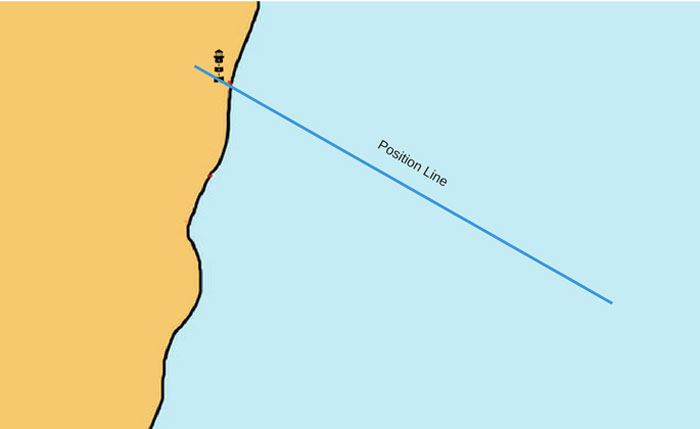 This line is a position line as your position ought to be somewhere on this line.
This line is a position line as your position ought to be somewhere on this line.
But you see, if I randomly choose 5 points on this line, one of which is your position, Can you tell be which one is your position?
No, right?
For this reason, we need two position lines separated by some angle to know our position. The point where two position lines would intersect will be your position.
So in our case, let us say we take the bearing of another lighthouse and it is 240 Degrees. We draw this position line.
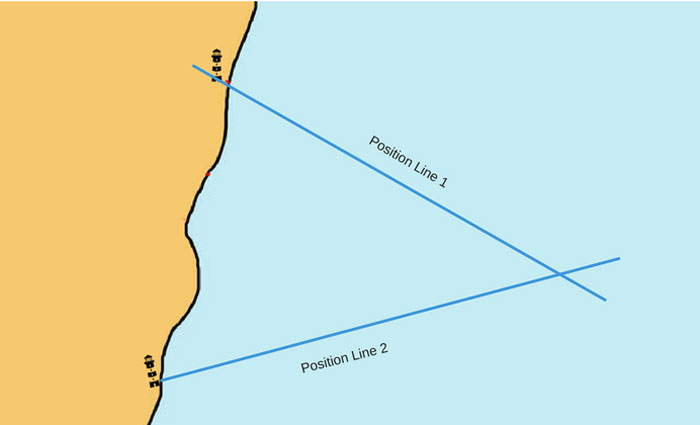 The position where these two positions line would intersect is your position.
The position where these two positions line would intersect is your position.
On board ships, whichever way you get the ship’s position, it always involves at least two position lines.
GPS gives us two position lines separated by 90 degrees angle. These position lines are
- Latitude
- Longitude
Position by celestial observations
The principles of plotting position by celestial observations is no different than usual terrestrial observations.
In celestial observations too, we need at least two position lines to get the ship’s position.
But to get a celestial position lines is not as simple as getting terrestrial position lines.
Now why I say it is different ?
When we take a bearing of an object (like a lighthouse), we have the lighthouse on the chart. We just plot the position line or position circle from that object.
But if we get the distance or bearing of the celestial object (like sun), we have two issues
- We do not have that celestial object on our chart from where we can just draw the position line, and
- The object is too far away
So what do we do? We have to do two things
- We have to shift our position to space (Zenith) so that we can measure our distance from the celestial object (Zenith distance).
- We have to bring the celestial object (for example sun) to the earth (Geographical position of the object) so that we can plot the measured distance on the earth’s surface.
Don’t worry. We don’t need to rent a rocket to go to space to measure that distance.
But I mentioned here few words.
- Zenith
- Zenith Distance
- Geographical position of the object
Let us see what are these.
Zenith
Zenith is the point on the celestial sphere directly above the observer. That is, it is the point that meets the celestial sphere when a line is drawn from the center of the earth through the observer.
Zenith Distance
In simple words, zenith distance is the distance between Zenith and center of the celestial body.
Geographical position of the celestial body
The geographical position of the celestial object is the position on earth’s surface that is obtained by joining a line from that object to the center of the earth.
The geographical position of any celestial object is given in term of GHA and Declination.
If we have to compare this with Latitude and longitude then
- Declination is the latitude of the celestial body and
- GHA is the longitude of the celestial body
To understand these terms, let us take the earth surrounded by the celestial sphere.
The celestial sphere is the imaginary sphere of infinite radius with its center at the center of the earth.
Let us say our position is at O.
Now join the center of the earth to our position and extend it to meet the celestial sphere. The point where it meets the celestial sphere is our (observer’s) zenith. We denote it by Letter “Z”.
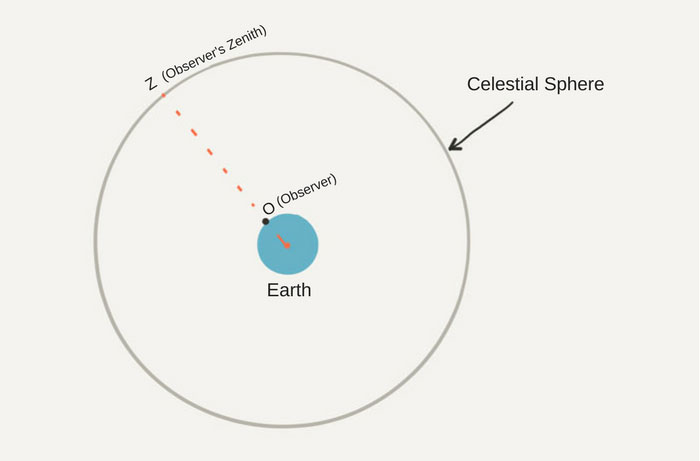 Now let us assume the celestial body (we will take the example of Sun) is at position “X”
Now let us assume the celestial body (we will take the example of Sun) is at position “X”
The distance of arc ZX is the zenith distance. It is measured as the angle at the center of the earth.
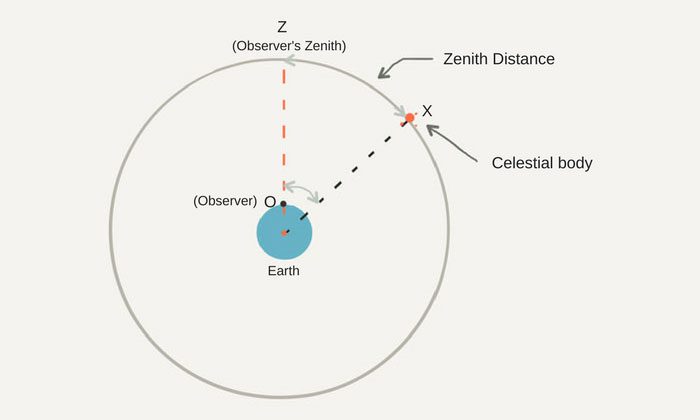 For example if the zenith distance was 40 Degrees, on the surface of the earth this would mean a distance of 2400 miles. One degree at the center of earth approximately equals to 60 Miles.
For example if the zenith distance was 40 Degrees, on the surface of the earth this would mean a distance of 2400 miles. One degree at the center of earth approximately equals to 60 Miles.
If we need to draw this position circle, we need to draw this from the geographical position of the celestial body.
So if we draw a circle of 2400 Miles (40 deg x 60 miles), from sun’s geographical position, our position will be somewhere on that circle.
Ideally, we would have got the position circle with this distance. Zenith distance should be all that we need to get one position line.
If we compare it to the terrestrial position lines, zenith distance can be compared to the range.
But only problem is it would be difficult to draw this big position circle on the chart.
Not only that. This big position circle would cover half the world. So it would be like saying that the ship’s position is anywhere on this earth.
So even though we have one position circle, it is of no use to us as this cannot be plotted.
Then how do we make use of it to get ship’s position?
Well, first we can shorten this position circle and concentrate only on that portion of it which is near to our DR position.
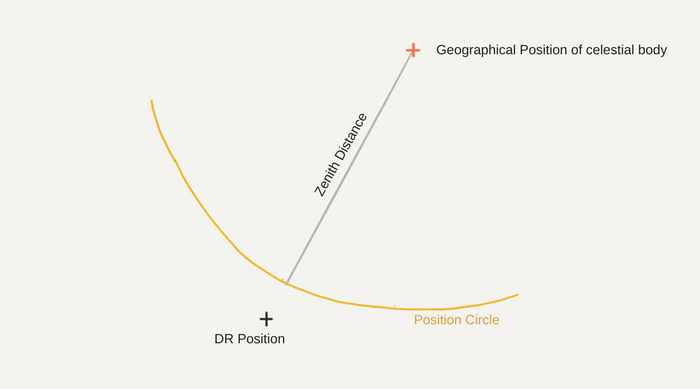 This part of the position circle can considered to be a straight line and thus a position line.
This part of the position circle can considered to be a straight line and thus a position line.
This is because for a circle of as large radius as hundreds of miles, a small arc will look like a straight line.
The direction of this straight line near the DR position of the ship can be taken as the direction of the Position line.
But to get the direction of this Position line, we still need to draw the arc of 2400 miles and measure the angle of the position line. Isn’t it? Which we earlier agreed is difficult.
We can find the direction of the position line in a different way.
We know that tangent to a circle is at 90 degrees to the radius of the circle.
So if we take the azimuth of the celestial body, it will pass through the radius of this position circle. And the a line 90 degrees to the azimuth will be the position line we need.
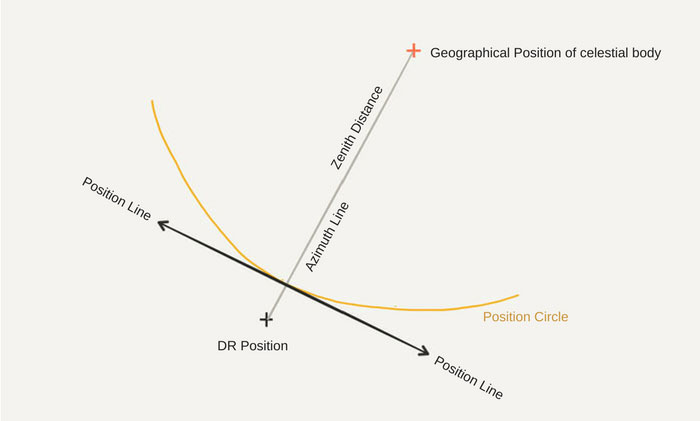 So we calculate the azimuth of the celestial body and our position line will be 90 degrees from the azimuth.
So we calculate the azimuth of the celestial body and our position line will be 90 degrees from the azimuth.
Let us say, we calculate the azimuth of the sun and found it to be 060 Degrees. The position line will be 150 deg – 330 Deg.
Now there are two questions that should be troubling our mind.
We said that we will have
- Distance from our position to the geographical position of the celestial body, and
- Azimuth of the celestial body
If we compare this with terrestrial objects, this is kind of saying that we have range and bearing of a lighthouse.
If this is so then,
Wouldn’t the intersection of azimuth and zenith distance of the celestial body be the ship’s position?
Well, actually the answer is that it certainly should be the ship’s position. But provided all the data is correct.
If there is slightest of the difference between the actual azimuth and the azimuth we calculate, the position will be offset by miles.
For example with the 1-degree error in azimuth for position circle of 2400 miles, the position will be offset by approx 40 miles. I leave the math up to you.
There is another reason for this.
For calculating the azimuth of the celestial body, we have used the observed position of the ship. This is not our actual position (which of course we intend to calculate with all this exercise).
Which means that the azimuth is for observed position and not at the ship’s actual position.
Where does sextant fit in all this?
If we need to get our basics of sight calculation right, there is one final question we must answer.
Where does sextant fit in all this?
As I explained little while earlier that to get a celestial position line, we need two values
- Zenith distance of the celestial body
- Azimuth of the celestial body
Getting the azimuth of the celestial body is a simple calculation. We calculate the azimuth with A,B,C tables (or by solving PZX triangle) all the time for compass error calculations.
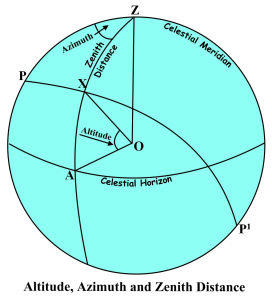 But how can we get the zenith distance of the celestial body ?
But how can we get the zenith distance of the celestial body ?
Well, there is a relation between zenith distance and the altitude of the celestial body.
The sum of altitude and zenith distance is always 90 degrees.
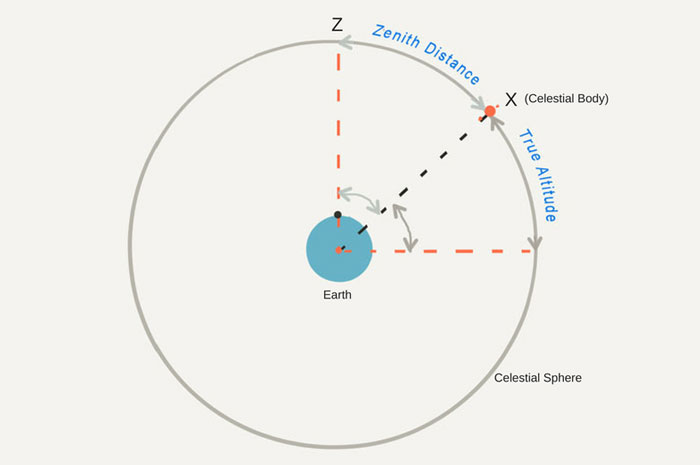 So if we know the altitude of the celestial body, we would know the zenith distance.
So if we know the altitude of the celestial body, we would know the zenith distance.
The sextant measures the altitude and that is where it fits in the sight calculation process.
There are few corrections that need to be applied to the altitude measured with the sextant to get the true altitude of the body.
So in all the sight calculations, all we are aiming for is
- To get a position line which we can calculate by calculating the azimuth of the celestial body
- To get the position from where we need to draw this position line. This we get by calculating the zenith distance of the celestial body
Conclusion
To fix the position of ship by celestial sight requires two things
- A position line
- A position through which to draw the position line
We get the position line by calculating the azimuth of the celestial body. The position line is 90 degrees from the azimuth.
We also need the position from which to draw this position line. This is calculated by using the Zenith distance of the body, which we can get from the altitude of the body.
The intersection of two such position lines brought to same time will give the ship’s position.
Whole this process of may look boring but more you practice it, more interesting it becomes.
And when you have mastered the art of fixing ship’s position by sextant, you can proudly own this quote.
All I need a ship and a star to steer her by.
Share this:

About Capt Rajeev Jassal
Capt. Rajeev Jassal has sailed for over 24 years mainly on crude oil, product and chemical tankers. He holds MBA in shipping & Logistics degree from London. He has done extensive research on quantitatively measuring Safety culture onboard and safety climate ashore which he believes is the most important element for safer shipping.
Search Blog
21 Comments


sir, can you plz tell me why IG is not used in bunker tanks but used in cargo tanks?

The flash point of bunker oil is more than 60 C and it is not flammable...

but sir we use ig if we carry fuel oil in cargo tanks.

Sir, your explanation is better than the textbooks!

Thanks, Avinash...

sir explain about all bridge equipment

I will write on bridge equipments in near future...

Very nice and explanatory approach ,must say many many thanks and wish for more knowledge of many forgotten equipments of a board ship .

Thanks Piyush...

Your explanations are simple and legible. God bless you sir.

Sir explain damaged stability and ability to calculate predicted stability.

I am from Gambia and really appreciate your work, it is simple and easy to understand. Many thanks

sir your explanation is so easy to understand.we appreciate your effort sir

Sir why position line is always perpendicular to azimuth?

I red about sextant on many websites and this is the best and simple note I found, thanks. Can we get pdf version ?

Thank you for your kind and good effort. You explain very easy to understand.

I have read your articles they are good.. there is one guy asking for sextant.. why it is 1/6th of circle why not half of cirlcle or why not full circle ? Your answer regarding this will be helpful to us..

Respected sir all your blogs are really amazing and informative. Keep writing and enlighten us always sir.

Excellent. Thank you for sharing your information with us, sir.
Leave Comment
More things to do on myseatime

MySeaTime Blogs
Learn the difficult concepts of sailing described in a easy and story-telling way. These detailed and well researched articles provides value reading for all ranks.

Seafarers Question Answers
Ask or answer a question on this forum. Knowledge dies if it remains in our head. Share your knowledge by writing answers to the question

MySeaTime Podcast
This podcast on the maritime matters will provide value to the listeners. Short, crisp and full of value. Stay tuned for this section.


Respected sir , I really dnt having any appreciable words in my treasure just to dignify you ...Our Expertise must someway or other will be always count on you sir...You making things so simple so as an damn idiot can understand well
Thanks, Snehashish...